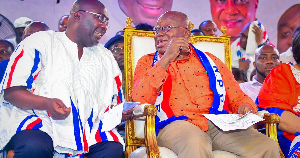 Dr Bawumia and President Akufo-Addo
Dr Bawumia and President Akufo-Addo
The eight-year tenure of the Akufo-Addo/Bawumia administration in Ghana has concluded, leaving behind a complex and deeply contested legacy. While supporters point to certain achievements, a prevailing sentiment across the nation suggests that the period has left deep scars on the national psyche. These scars are not merely superficial; they run deep into the fabric of Ghanaian society, impacting economic stability, social cohesion, and the public's trust in governance.
One of the most prominent scars is the severe economic downturn experienced during the latter half of the administration. The once-promising economic growth of the early years gave way to a period marked by high inflation, a depreciating cedi, and a crippling debt crisis.
Critics argue that a lack of fiscal discipline and prudent economic management contributed significantly to this crisis, leaving ordinary Ghanaians burdened with rising costs of living and a diminished quality of life. The impact extends beyond mere financial hardship; it has eroded trust in the government's ability to manage the economy effectively, fostering widespread disillusionment and uncertainty about the future.
Beyond the economic challenges, the administration's handling of social issues also contributed to the feeling of a nation wounded. While initiatives were launched to address poverty and inequality, their impact appears to have been insufficient to counter the rising tide of economic hardship.
Furthermore, accusations of corruption and cronyism cast a long shadow over the government's credibility and damaged public trust. The perception that opportunities were not equitably distributed fuelled social unrest and deepened existing societal divisions. This perception, whether accurate or not, has left a lasting impact, eroding social capital and hindering national unity.
The administration's approach to freedom of speech and press also garnered significant criticism. Instances of alleged intimidation and harassment of journalists and dissenting voices raised concerns about the state of press freedom and the broader health of democracy.
While Ghana maintains a reputation for relative press freedom compared to some of its neighbours, these incidents, coupled with other perceived limitations on expression, fostered an environment of self-censorship and hampered open dialogue – crucial elements for a healthy democracy. This suppression, even if unintentional, contributed to a sense of unease and contributed to the overall feeling of disillusionment.
Furthermore, the management of key sectors such as education and healthcare also came under scrutiny. Despite investments in these areas, concerns remain about the quality of services delivered and the accessibility of these essential services to the wider population, particularly in rural communities. These unmet expectations further deepened the sense of national disappointment and fuelled public discontent.
In conclusion, while a complete evaluation of the Akufo-Addo/Bawumia presidency necessitates a comprehensive and nuanced analysis considering both successes and failures, the prevailing narrative suggests that the overall experience has left deep and lasting scars on the Ghanaian psyche. The economic hardship, the perceived lack of accountability, and the erosion of public trust represent significant challenges for the incoming administration.
Addressing these scars will require more than just policy changes; it will necessitate a fundamental shift in governance culture, prioritising transparency, accountability, and inclusive development to restore faith in the nation's leadership and build a more prosperous and equitable future for all Ghanaians. The road to healing will be long and arduous, requiring concerted effort from all stakeholders to rebuild the national trust that has been significantly eroded.